高中英语牛津译林版(2019)必修第三册Unit 1 Nature in the balance-Grammar(省略)课件(18张PPT)
文档属性
| 名称 | 高中英语牛津译林版(2019)必修第三册Unit 1 Nature in the balance-Grammar(省略)课件(18张PPT) |
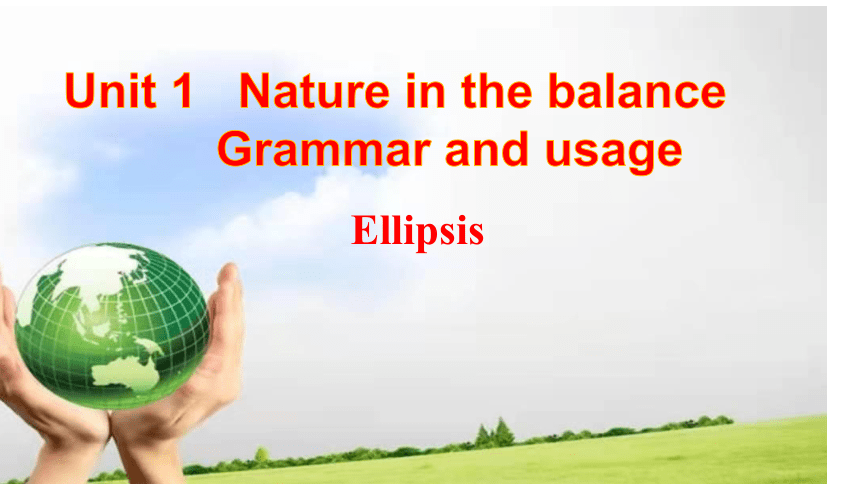
|
|
| 格式 | zip | ||
| 文件大小 | 1.0MB | ||
| 资源类型 | 教案 | ||
| 版本资源 | 牛津译林版(2019) | ||
| 科目 | 英语 | ||
| 更新时间 | 2022-02-20 00:00:00 | ||
图片预览

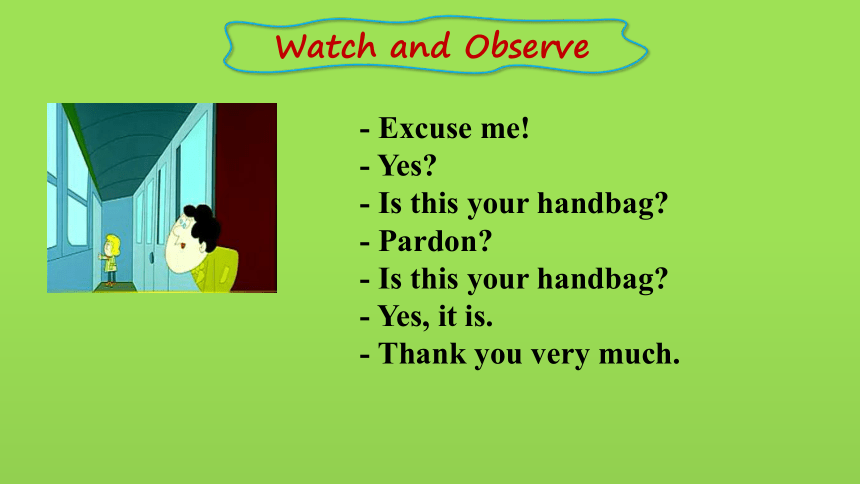
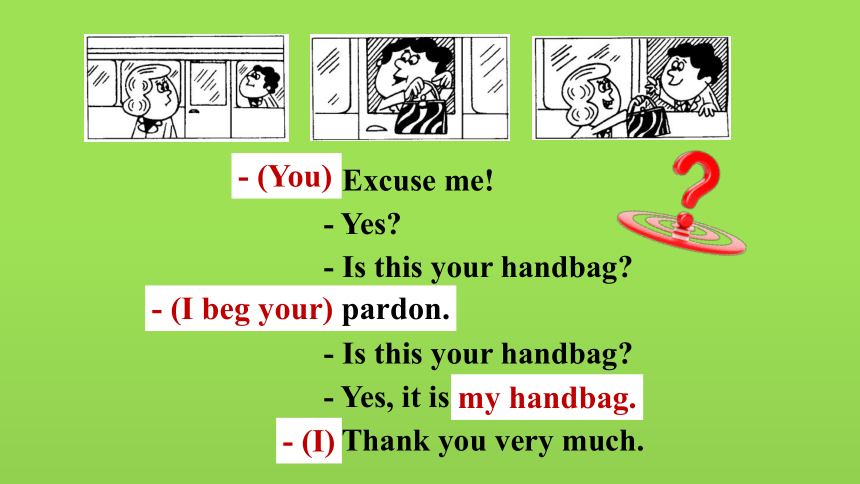

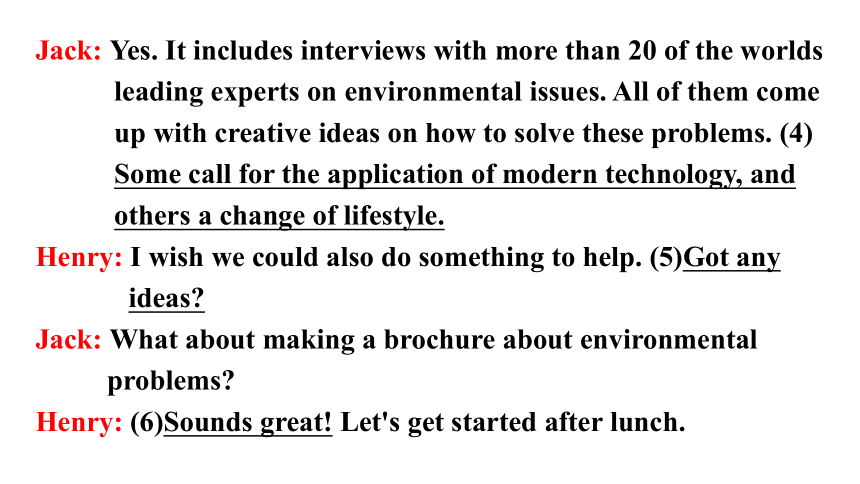
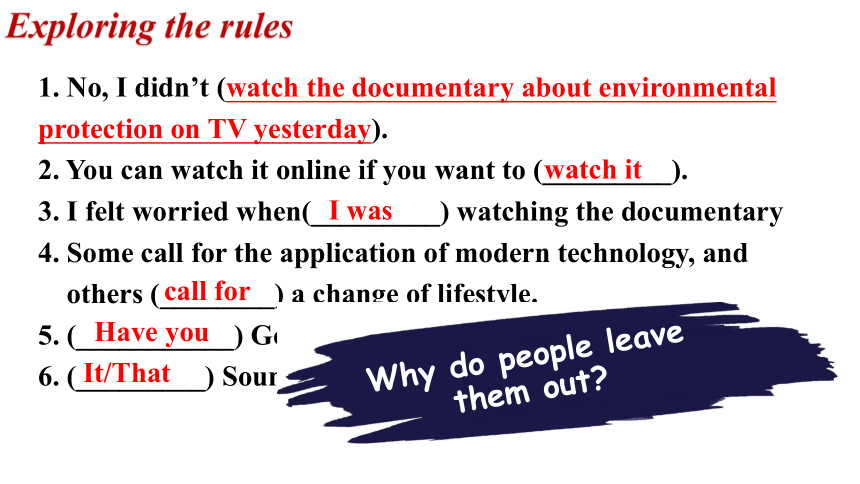
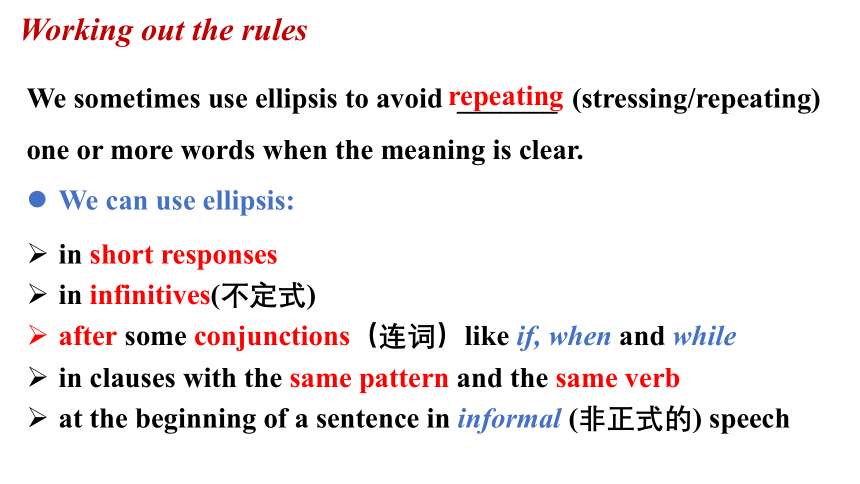
文档简介
(共18张PPT)
Unit 1 Nature in the balance
Grammar and usage
Ellipsis
- Excuse me!
- Yes
- Is this your handbag
- Pardon
- Is this your handbag
- Yes, it is.
- Thank you very much.
Watch and Observe
- Excuse me!
- Yes
- Is this your handbag
Pardon
- Is this your handbag
- Yes, it is.
- Thank you very much.
- (You)
- (I beg your) pardon.
my handbag.
- (I)
Jack: Hi, Henry! Did you watch the documentary about
environmental protection on TV yesterday.
Henry: (1) No, I didnt.
Jack: What a pity! I highly recommend it. (2)You can watch it
online if you want to. It’s about some of the worst
environmental problems we’re facing today. Global
warming, for example, is a major problem caused by
greenhouse gases. It may lead to extreme weather events:
droughts, heatwaves and so on. (3)I felt worried when
watching the documentary.
Henry: Does it also talk about solutions to these problems
Part A Exploring the rules
Jack: Yes. It includes interviews with more than 20 of the worlds
leading experts on environmental issues. All of them come
up with creative ideas on how to solve these problems. (4)
Some call for the application of modern technology, and
others a change of lifestyle.
Henry: I wish we could also do something to help. (5)Got any
ideas
Jack: What about making a brochure about environmental
problems
Henry: (6)Sounds great! Let's get started after lunch.
1. No, I didn’t (watch the documentary about environmental protection on TV yesterday).
2. You can watch it online if you want to (_________).
3. I felt worried when(_________) watching the documentary
4. Some call for the application of modern technology, and
others (________) a change of lifestyle.
5. (___________) Got any ideas
6. (_________) Sounds great!
watch it
I was
call for
Have you
It/That
Exploring the rules
Why do people leave them out
We can use ellipsis:
Working out the rules
in short responses
in infinitives(不定式)
after some conjunctions(连词)like if, when and while
in clauses with the same pattern and the same verb
at the beginning of a sentence in informal (非正式的) speech
We sometimes use ellipsis to avoid _______ (stressing/repeating) one or more words when the meaning is clear.
repeating
1. No, I didn’t (watch the documentary about environmental protection on TV yesterday).
2. You can watch it online if you want to (watch it).
3. I felt worried when (I was) watching the documentary.
4. Some call for the application of modern technology, and others (call for) a change of lifestyle.
5. (Have you) Got any ideas
6. (It/That) Sounds great!
In short responses
In infinitives
After some conjunctions like if, when and while
In clauses with the same pattern and the same verb
At the beginning of a sentence in informal speech
At the beginning of a sentence in informal speech
1.在非正式场合,如果语境清晰,常省略_____或_____+_____。
2.在简短对话中,答句常保留______和______,省略其后主要动词以及上句出现过的其他内容。
(It/That)Sounds great!
(Are you) Ready
—Did you go to the museum yesterday
—No, I didn’t (go to the museum yesterday).
Working out the rules
主语
主语
动词
主语
助动词
3. 在由______或______连接的并列结构中,常常省略与前面______的主语、谓语或其他成份。
and
but
相同
Peter entered the classroom and (Peter) sat at his desk.
I like dancing but my brother (likes) singing.
What I said made Jack happy but (what I said made) Jane angry.
Jack must have been playing football and Mary (must
have been) doing her homework.
You’d better look out when (you are) crossing the street.
Wood gives off much smoke while (it is) burning.
I won’t attend his wedding unless(I am) invited.
Mother and father came back earlier than (they were) expected.
You need to make improvements where (it is) necessary.
Please call me back if (it is) possible.
4.在when, while, if, as if, though, although, as, than,until, once, unless,等引导的状语从句中,当从句主语和主句的主语_______且从句谓语中含有系动词_______或从句的主语为______时,从句中______和_______常被省略。
一致
be
主语
it
be动词
5.不定式作_________或___________时,常省略to后面的内容。
这些动词常见的有:ask, tell, advise, force, persuade, wish, allow, permit, forbid, expect, order, warn等。
You don’t have to do it if you don’t want to (do it).
You’d better not take medicine unless your doctor told you to (take medicine).
宾语
宾语补足语
如果不定式后接be动词或动词的完成式,省略句中往往保留be或 have。
I am busier now than I used to be (busy).
—Has Mike finished his project
—He seems to have (finished his project)
——你是一位律师吗?
——不是,但我以前是。
1.John worked hard but his brother didn’t work hard.
2.Whenever it is possible, he will come to my help.
3.When you are crossing the street, you should be careful.
4.Don’t go till I tell you to go.
5.——Hasn’t he finished writing the report
——No, but he ought to have finished it.
Rewrite the sentences with ellipsis.
Applying the rules
Find the mistakes and rewrite the sentences using ellipsis.
1. I cannot watch the documentary this weekend, though I would like.
We cannot leave out to in infinitives when using ellipsis.
I cannot watch the documentary this weekend, though I would like to.
2. Cows live on land, and fish the water.
Different prepositions are used and they can’t be left out.
Cows live on land, and fish in the water.
3. The Amazon rainforest is smaller now than was 50 years ago.
When using ellipsis in clauses with the same pattern, the subject and the verb should be left out altogether.
The Amazon rainforest is smaller now than 50 years ago.
4. He had planned to borrow a book on environmental protection, but he didn’t do.
When using ellipsis in compound sentences, the part behind the auxiliary verb should be left out altogether.
He had planned to borrow a book on environmental protection, but he didn’t.
5. When taking photos of wildlife, every effort should be made to ensure that we keep away from the animals.
When using ellipsis in adverbial clauses, we need to make sure that the subject of the main clause is the same as the subject of the subordinate clause.
When taking photos of wildlife, we should make every effort to ensure that we keep away from the animals.
B2 Jack is sharing with his classmates his experience of taking part in a forest clean-up activity. Use ellipsis where necessary. Put brackets around the word(s)that can be left out.
Last weekend, I took part in a forest clean-up activity. It was organized by Green Hope, an organization devoted to protecting forests. At first I didn’t want to take part in the forest clean-up activity , but then I thought, “What if nobody goes ” Our team leader, Joe, took us to a forest outside the city. I was sad to see litter everywhere. There was a “No littering is allowed here” sign
[
]
[
]
at the entrance to the forest, but that didn’t stop people from throwing their rubbish on the ground. Joe divided us into two groups: one group cleaned up the north side of the forest, and the other group cleaned up the south side of the forest. We worked for several hours and we were happy to see that the forest looked cleaner than it had looked before. It was absolutely worth our effort! There’ll be another clean-up activity in the green belt next Saturday. You can find Joe and sign up if you’re willing to help. Everyone who takes part in the activity will receive a medal. I’ll join you too if I have time.
]
[
[
]
[
]
[
]
]
[
[
]
[
]
Unit 1 Nature in the balance
Grammar and usage
Ellipsis
- Excuse me!
- Yes
- Is this your handbag
- Pardon
- Is this your handbag
- Yes, it is.
- Thank you very much.
Watch and Observe
- Excuse me!
- Yes
- Is this your handbag
Pardon
- Is this your handbag
- Yes, it is.
- Thank you very much.
- (You)
- (I beg your) pardon.
my handbag.
- (I)
Jack: Hi, Henry! Did you watch the documentary about
environmental protection on TV yesterday.
Henry: (1) No, I didnt.
Jack: What a pity! I highly recommend it. (2)You can watch it
online if you want to. It’s about some of the worst
environmental problems we’re facing today. Global
warming, for example, is a major problem caused by
greenhouse gases. It may lead to extreme weather events:
droughts, heatwaves and so on. (3)I felt worried when
watching the documentary.
Henry: Does it also talk about solutions to these problems
Part A Exploring the rules
Jack: Yes. It includes interviews with more than 20 of the worlds
leading experts on environmental issues. All of them come
up with creative ideas on how to solve these problems. (4)
Some call for the application of modern technology, and
others a change of lifestyle.
Henry: I wish we could also do something to help. (5)Got any
ideas
Jack: What about making a brochure about environmental
problems
Henry: (6)Sounds great! Let's get started after lunch.
1. No, I didn’t (watch the documentary about environmental protection on TV yesterday).
2. You can watch it online if you want to (_________).
3. I felt worried when(_________) watching the documentary
4. Some call for the application of modern technology, and
others (________) a change of lifestyle.
5. (___________) Got any ideas
6. (_________) Sounds great!
watch it
I was
call for
Have you
It/That
Exploring the rules
Why do people leave them out
We can use ellipsis:
Working out the rules
in short responses
in infinitives(不定式)
after some conjunctions(连词)like if, when and while
in clauses with the same pattern and the same verb
at the beginning of a sentence in informal (非正式的) speech
We sometimes use ellipsis to avoid _______ (stressing/repeating) one or more words when the meaning is clear.
repeating
1. No, I didn’t (watch the documentary about environmental protection on TV yesterday).
2. You can watch it online if you want to (watch it).
3. I felt worried when (I was) watching the documentary.
4. Some call for the application of modern technology, and others (call for) a change of lifestyle.
5. (Have you) Got any ideas
6. (It/That) Sounds great!
In short responses
In infinitives
After some conjunctions like if, when and while
In clauses with the same pattern and the same verb
At the beginning of a sentence in informal speech
At the beginning of a sentence in informal speech
1.在非正式场合,如果语境清晰,常省略_____或_____+_____。
2.在简短对话中,答句常保留______和______,省略其后主要动词以及上句出现过的其他内容。
(It/That)Sounds great!
(Are you) Ready
—Did you go to the museum yesterday
—No, I didn’t (go to the museum yesterday).
Working out the rules
主语
主语
动词
主语
助动词
3. 在由______或______连接的并列结构中,常常省略与前面______的主语、谓语或其他成份。
and
but
相同
Peter entered the classroom and (Peter) sat at his desk.
I like dancing but my brother (likes) singing.
What I said made Jack happy but (what I said made) Jane angry.
Jack must have been playing football and Mary (must
have been) doing her homework.
You’d better look out when (you are) crossing the street.
Wood gives off much smoke while (it is) burning.
I won’t attend his wedding unless(I am) invited.
Mother and father came back earlier than (they were) expected.
You need to make improvements where (it is) necessary.
Please call me back if (it is) possible.
4.在when, while, if, as if, though, although, as, than,until, once, unless,等引导的状语从句中,当从句主语和主句的主语_______且从句谓语中含有系动词_______或从句的主语为______时,从句中______和_______常被省略。
一致
be
主语
it
be动词
5.不定式作_________或___________时,常省略to后面的内容。
这些动词常见的有:ask, tell, advise, force, persuade, wish, allow, permit, forbid, expect, order, warn等。
You don’t have to do it if you don’t want to (do it).
You’d better not take medicine unless your doctor told you to (take medicine).
宾语
宾语补足语
如果不定式后接be动词或动词的完成式,省略句中往往保留be或 have。
I am busier now than I used to be (busy).
—Has Mike finished his project
—He seems to have (finished his project)
——你是一位律师吗?
——不是,但我以前是。
1.John worked hard but his brother didn’t work hard.
2.Whenever it is possible, he will come to my help.
3.When you are crossing the street, you should be careful.
4.Don’t go till I tell you to go.
5.——Hasn’t he finished writing the report
——No, but he ought to have finished it.
Rewrite the sentences with ellipsis.
Applying the rules
Find the mistakes and rewrite the sentences using ellipsis.
1. I cannot watch the documentary this weekend, though I would like.
We cannot leave out to in infinitives when using ellipsis.
I cannot watch the documentary this weekend, though I would like to.
2. Cows live on land, and fish the water.
Different prepositions are used and they can’t be left out.
Cows live on land, and fish in the water.
3. The Amazon rainforest is smaller now than was 50 years ago.
When using ellipsis in clauses with the same pattern, the subject and the verb should be left out altogether.
The Amazon rainforest is smaller now than 50 years ago.
4. He had planned to borrow a book on environmental protection, but he didn’t do.
When using ellipsis in compound sentences, the part behind the auxiliary verb should be left out altogether.
He had planned to borrow a book on environmental protection, but he didn’t.
5. When taking photos of wildlife, every effort should be made to ensure that we keep away from the animals.
When using ellipsis in adverbial clauses, we need to make sure that the subject of the main clause is the same as the subject of the subordinate clause.
When taking photos of wildlife, we should make every effort to ensure that we keep away from the animals.
B2 Jack is sharing with his classmates his experience of taking part in a forest clean-up activity. Use ellipsis where necessary. Put brackets around the word(s)that can be left out.
Last weekend, I took part in a forest clean-up activity. It was organized by Green Hope, an organization devoted to protecting forests. At first I didn’t want to take part in the forest clean-up activity , but then I thought, “What if nobody goes ” Our team leader, Joe, took us to a forest outside the city. I was sad to see litter everywhere. There was a “No littering is allowed here” sign
[
]
[
]
at the entrance to the forest, but that didn’t stop people from throwing their rubbish on the ground. Joe divided us into two groups: one group cleaned up the north side of the forest, and the other group cleaned up the south side of the forest. We worked for several hours and we were happy to see that the forest looked cleaner than it had looked before. It was absolutely worth our effort! There’ll be another clean-up activity in the green belt next Saturday. You can find Joe and sign up if you’re willing to help. Everyone who takes part in the activity will receive a medal. I’ll join you too if I have time.
]
[
[
]
[
]
[
]
]
[
[
]
[
]
同课章节目录
- Unit 1 Nature in the balance
- Welcome to the unit
- Reading
- Grammar and usage
- Integrated skills
- Extended reading
- Project
- Unit 2 Natural disasters
- Welcome to the unit
- Reading
- Grammar and usage
- Integrated skills
- Extended reading
- Project
- Unit 3 The world online
- Welcome to the unit
- Reading
- Grammar and usage
- Integrated skills
- Extended reading
- Project
- Unit 4 Scientists who changed the world
- Welcome to the unit
- Reading
- Grammar and usage
- Integrated skills
- Extended reading
- Project
